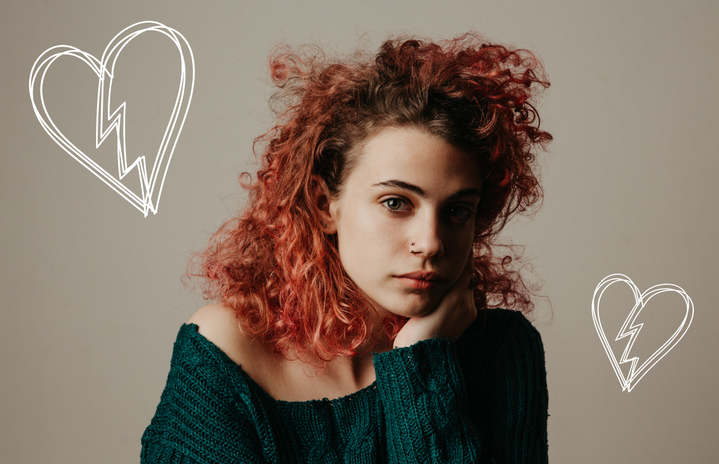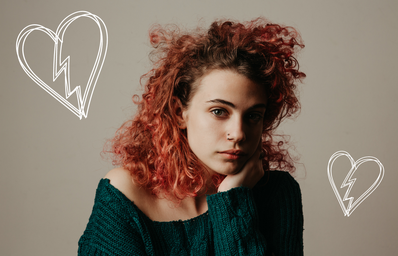My mother places my cake in front of me, the “22” candles flickering brightly in the darkness of our dining room. The chorus of off-pitch singing fills the space, my family and boyfriend all smiling at me. I look down at the cake that my sister artfully frosted. The pale purple icing appears almost gray in the dark, the bright rainbow sprinkles scattered along the sugary perimeter providing a stark contrast.
As the song nears its end, I try to think of my wish. Twenty-two trips around the sun and I have no idea what to wish for. Even though I have so many dreams, so many things I want to see fulfilled, I don’t quite know how or what to hope for in the moment.
I blow out the candles anyway.
This birthday was probably the hardest one for me thus far, despite it consisting of a pleasant day spent sightseeing and shopping in San Francisco and enjoying a peaceful meal at home surrounded by some of the people I love most. There was this lingering sense of sadness, uncertainty, and loss that I couldn’t quite shake as the day went on. I’ve never liked the idea of getting older, but something was different about this birthday. It didn’t carry the same excitement of turning 18 and officially being an adult or turning 21 and becoming an official official adult. There’s nothing all that special about 22 unless a looming sense of dread counts.
Last year, the song “Nothing New” by Taylor Swift featuring Phoebe Bridgers was released, perfectly yet painfully encapsulating the discomfort and hopelessness surrounding getting older as a woman. I was driving along the California coast by Manhattan Beach the first time I listened to the song, looking out at the crashing waves as Swift’s melodic singing and Bridgers’ melancholy and wistful tone wrapped around me, feeling like I was in my own music video. It was like the song was about me and how I felt about getting older and being at this strange point in my life.
I nearly started crying.
According to Swift, the song is about “being scared of aging and things changing and losing what you have.” Although many have interpreted the song to be about female singers in the music industry losing their relevance in popular culture as they age, the song can still be applied to everyday people like me.
Societally, women tend to lose their relevance as they age, largely because we are viewed and judged based on our looks and physical appearance — and according to society, these aspects of ourselves are the most important part, and they diminish in value through age.
At a young age, girls are told to be one thing and to under no circumstances be another. There are great expectations for young women – expectations that can be difficult to live up to. Swift’s song hits the nail on the head right from the opening verse, where she sings, “They tell you while you’re young / Girls, go out and have your fun / Then they hunt and slay the ones who actually do it.” This unfair dichotomy has been painstakingly prevalent in our society for generations: you’re either a prude or a slut, dumb or a nerd. There can be no in-between, no winning; you always need to be labeled, to be put inside of a box while you’re still trying to figure out who you are.
Personally, I was always categorized into the nerdy box, based mainly on my appearance. Due to genetics, I had to get glasses in second grade and then braces to straighten my teeth in middle school, fitting the quintessential “nerdy” archetype (it also didn’t help that I could always be found with my nose in a book). I often felt taken advantage of or devalued as my classmates would ask me for the notes or to take a “quick look” at my homework. I was automatically viewed as the smart one solely because of my appearance, and I felt as though I wasn’t noticed or valued in any other aspect. Although it may seem vain or materialistic, this deep insecurity ultimately led me to get contacts in the eighth grade in an effort to be more than just “the nerdy girl.” In retrospect, I’m not sure if this entirely helped reshape my image — because, at the end of the day, I was still me — but it made me feel a little better to take charge of my physical identity, even in a small way.
The hypersexualization of young women ultimately stems from the inherent misogyny prevalent in our society. This hypersexualization of women, and especially during a woman’s teenage years, can be seen in every aspect of popular culture, infiltrating film, music, books, and other mediums — and that bleeds its way into real, daily life.
This hypersexualization is especially prominent in teenage girls (why are so many love songs about girls who are seventeen?) which can ultimately lead them to objectify themselves, as well as experience mental health issues such as anxiety and depression. Euphoria, for instance, centers around the hypersexualization of high school girls, which perpetuates that message to young women who watch it. Although there is absolutely nothing wrong with embracing one’s sexuality, there is a line crossed when we sexualize kids — not only does it affect them at that point in their life, but also as they get older.
When you get into your early twenties, your body changes – something that a lot of people don’t talk about. Our bodies are constantly changing, despite the focus on puberty happening when you’re in your early teenage years. But there’s something called a “second puberty” in which women in their twenties often experience new physical changes to their bodies. If you aren’t expecting to experience any new changes to your body, they can be quite startling. I remember being confused as to why I didn’t weigh the same as I did when I was 18, and I slowly came to the realization that my body is still growing and that it’s normal to not have the same body as I did when I was 18. But societally, I felt like something was wrong with me for not having the same body, for not being able to squeeze into the same pair of jeans that fit me just a couple of years ago.
In general, being in your early twenties grants not only physical changes but also longer-term life changes: graduating high school or college, trying to find a job or ways to make ends meet, potentially moving out of your family’s house. There are so many difficult and uncomfortable states of limbo during this time period, and you may find yourself constantly comparing yourself to what stages your friends and peers are at. Some of my old high school classmates are getting engaged now — everyone is at such different points in their life, and it can make you second guess where you’re at. There’s this perpetual thought, this perpetual fear that I have no idea what I’m doing.
In the same vein, the verse that I perhaps most relate to in “Nothing New” is “I wake up in the middle of the night / It’s like I can feel time moving / How can a person know everything at 18 but nothing at 22? / And will you still want me when I’m nothing new?” I came to college at 18, and although I was undeclared at the time, I had a clear-cut path: I knew I would be spending the next four years of my life at Loyola Marymount University, and I had professors and advisors to help support me with deciding my major and ensuring I took the correct classes to graduate on time.
As I reached the end of my freshman year in college, my life began to solidify itself when I declared English as my major and later added public relations as a minor. I joined a sorority and my own school’s chapter of Her Campus. I made friends and lost others. I moved into a rental house near my school during my junior year with some of my best friends. I found stability and routine. Even though I was still a bit lost and unsure of my future at times (and especially amid an unprecedented pandemic), I had the naïve thought in my head that by the time I graduated, I’d have it all figured out.
Now, I’m 22, and I honestly have no clue what direction my life is going to go in after I graduate. I don’t know where I’m going to live or with whom. I don’t know what kind of job I’m going to get or if I’m going to attend graduate school. People are constantly asking me about my plans, and I have no idea what to tell them. When that’s what I say, they laugh. “Oh, you don’t need to worry about that yet,” or, “That’s OK!” they say, but really, it doesn’t feel OK at all. And that’s scary because it feels like I have way less clarity about where my life is going than I did when I was 18.
How does that happen? Aren’t things supposed to feel more certain, more concrete, more sure when you’re an adult?
The harsh answer that nobody wants to tell you is, no, things aren’t any clearer. In fact, the future is foggier than it’s ever been. Being a woman in your twenties is tumultuous, a time full of ups and downs accompanied by feelings of worthlessness and discomfort. It constantly feels like you’re trying to gain your footing on a sheet of ice, but you’re wearing socks, so you have no traction — and as soon as you start to find some stability, you fall again. At the age of 22, I feel like I’m in a strange in-between space of trying to figure out who I am and what I want to do next while also managing my own personal insecurities and images of perceived self-worth at this moment in time. It’s an awkward stage of limbo that no one really talks about — a point in which you’re dealing with personal struggles as well as larger, societal ones. And, in the words of Swift, you find yourself wondering, “How did I go from growing up to breaking down?”


